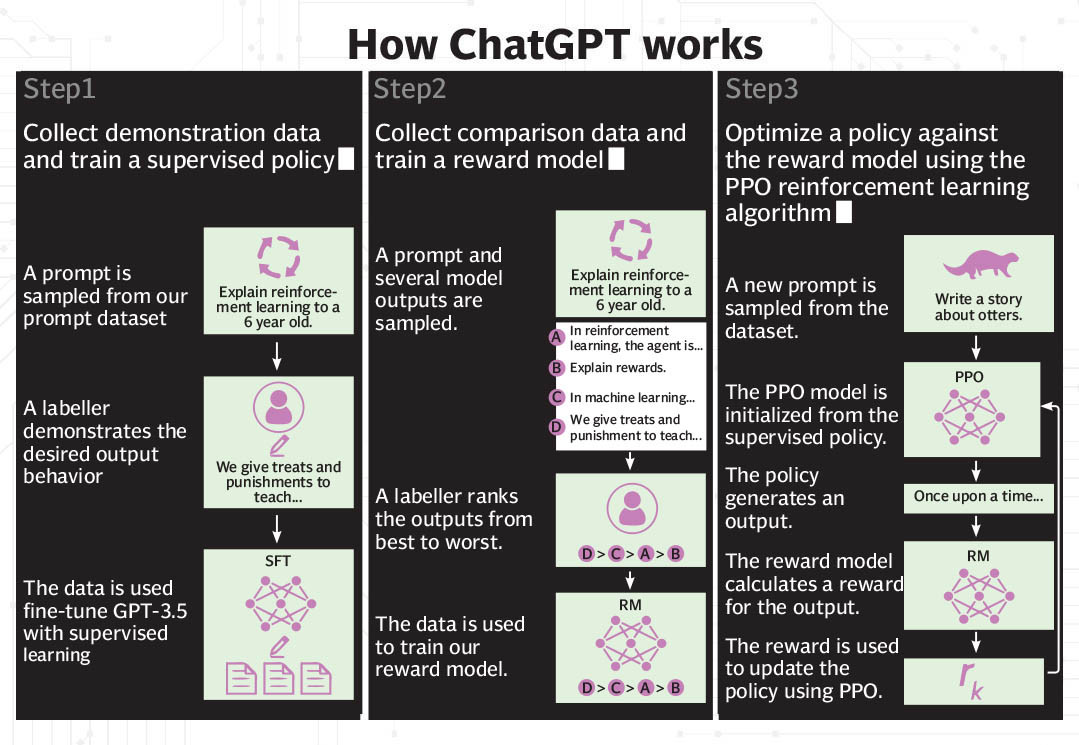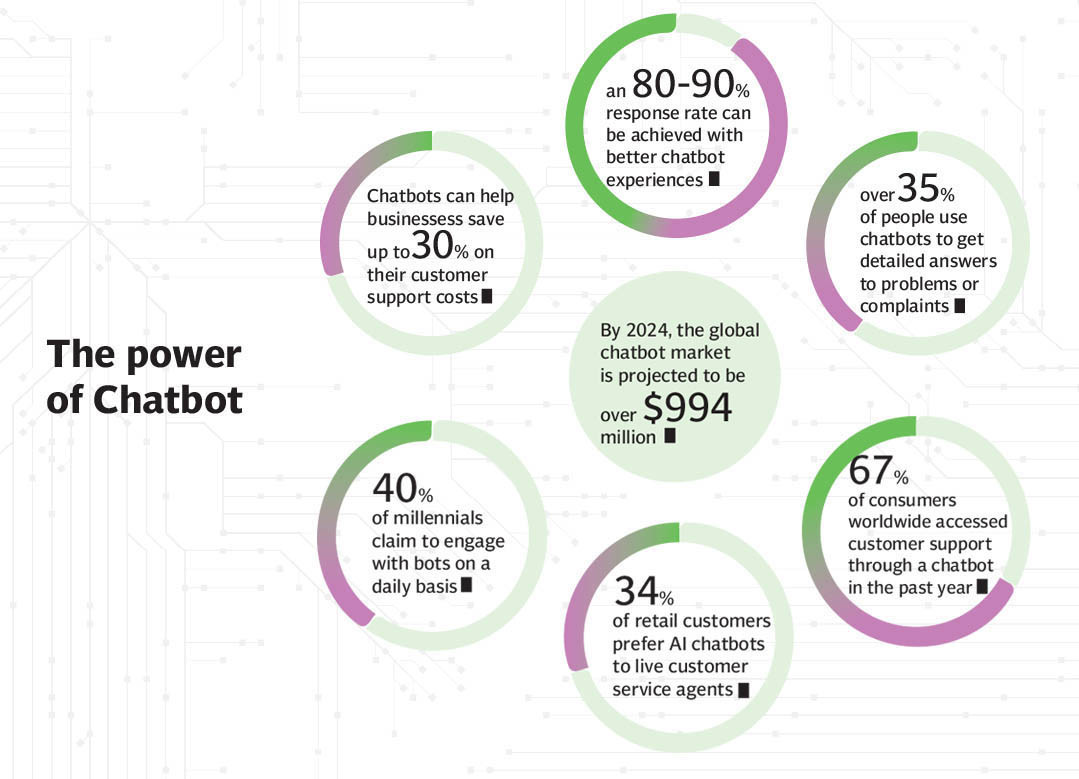Artificial Intelligence (AI) has rapidly become one of the most influential technologies in our modern world. From virtual assistants to self-driving cars, the potential applications of AI are vast and far-reaching. As AI continues to grow and mature, many experts believe that it will soon become a tipping point in our dependency on technology. An example is the use of the Chat Generative Pre-trained Transformer or ChatGPT, an AI tool that has taken the internet by storm. Other than producing audio and images, this free technology, released last year, can also write code, make arguments and even tell jokes. Recently, as ChatGPT was seen to have passed some of the toughest exams all over the world, including the US medical licencing exam, its impact has become a topic of hot discussion.
Just as virtual assistants like Amazon's Alexa and Apple's Siri are now household names, helping people with everything from answering questions to controlling their smart home devices, the integration of ChatGPT into our daily lives has already started.
As our dependence on AI grows, we risk losing our ability to think critically and make decisions for ourselves. As AI systems take over more and more tasks, we may become less engaged in the process of decision making, relying instead on AI to provide us with answers and solutions. This can lead to a decline in our problem-solving skills, as we become less adept at solving problems on our own and more reliant on AI to do so.
Additionally, our reliance on AI may also lead to a decline in creativity, as we become less likely to think outside the box and come up with original ideas. This shift away from critical thinking and problem-solving skills can have a negative impact on our ability to innovate and create, as well as on our ability to make informed decisions in our personal and professional lives. AI-powered personal assistants are changing the way we interact with technology, allowing us to complete tasks more efficiently and with less effort.

Dependence on efficient technology
The increased efficiency of AI systems is a major factor in our growing dependence on technology. AI has the ability to perform tasks much faster and more accurately than humans, making it easier for us to rely on technology. This is because AI can process vast amounts of data, make complex calculations, and complete tasks in a fraction of the time.
As a result, we have become accustomed to getting things done quickly and accurately, which has increased our dependence on technology. Whether it's analysing financial data, processing customer orders or automating routine tasks, AI is making it easier for us to rely on technology for our most important tasks.
AI has the ability to use data and machine-learning algorithms to personalise experiences and make recommendations based on our preferences, which can greatly enhance our daily lives. For example, AI-powered personal shopping assistants can suggest products based on our past purchases, while AI-powered virtual assistants can help us manage our schedule and keep track of our appointments. This increased personalisation can lead to greater dependence on technology as we come to rely on AI to make decisions for us and guide us through our daily lives.
The convenience of ChatGPT
ChatGPT can automate many routine tasks and simplify complex processes, making our lives easier and more convenient. With AI, we no longer have to waste time on repetitive or manual tasks, as AI systems can take care of these tasks for us. For example, AI-powered chatbots can answer customer inquiries and handle basic customer service tasks, freeing up human agents to focus on more complex tasks.
In the same way, ChatGPT can automate complex processes and make them more efficient, reducing the time and effort required to complete tasks. For example, AI can be used to optimise supply chain processes, streamline workflows and reduce the time required to process invoices and other paperwork. This increased convenience can lead to greater dependence on technology as we come to rely on AI to complete tasks for us.
Whether it's answering emails, processing invoices or managing customer inquiries, AI is making our lives easier and routine tasks more convenient for us. As a result, our dependence on technology is growing, and AI is becoming an indispensable part of our daily lives.

An overload of information
In an age of information overload, AI systems can play a crucial role in helping us make sense of the vast amounts of data we encounter every day. AI systems can analyse large amounts of data and provide us with relevant information in seconds. For example, AI-powered search engines can provide us with answers to our questions in real-time, while AI-powered news aggregators can curate articles and news stories based on our interests.
AI can also be used to analyse social media data and provide us with insights into public opinion, allowing organisations to stay ahead of the curve and make informed decisions. This ability of AI to help us make sense of the information we encounter can lead to greater dependence on technology as we come to rely on AI to provide us with relevant information.
Whether it's finding answers to our questions, staying informed about the latest news or keeping track of public opinion, AI is becoming an indispensable tool in our daily lives, and we are relying on it more and more to make sense of the information we encounter.
Virtual assistants and erosion of human agency
Virtual assistants, such as Siri and Alexa, are changing the way we interact with technology and they are becoming increasingly popular. These AI systems allow us to perform a wide range of tasks, from setting reminders and playing music, to ordering groceries and controlling smart home devices, simply by using voice commands. As we become more reliant on virtual assistants, we may become more dependent on technology as a whole.
For example, instead of manually setting reminders or checking our schedules, we can simply ask our virtual assistants to do it for us. This has led to increased dependence on virtual assistants and on technology as a whole.
AI-powered chatbots are being used to replace human customer service representatives, while AI algorithms are being used to replace human analysts in certain industries. This replacement of human skills and jobs by AI systems will diminish the role of humans across industries.
Smart devices, such as smartphones and smart home devices, are becoming increasingly common, and are changing the way we live our lives. For example, we are relying on smartphones more and more to manage our schedules, check the news and stay connected with others. Similarly, we are relying on smart home devices to control the temperature and lighting in our homes, and to automate routine tasks such as turning off the lights when we leave the room.
Relying on smart devices to perform a wide range of menial tasks for us inside our homes is considered to be a comfort, and perceived as a way to save up on time and hassle.
The rise of the Internet of Things (IoT)
IoT is leading to increased interconnectivity between devices and systems, making it easier for us to rely on technology. With the IoT, a vast network of devices and systems are connected to each other and to the internet, allowing us to access information and services at our fingertips. This increased interconnectivity can lead to greater dependence on technology as we become used to having access to information and services at our fingertips.
The increased interconnectivity provided by the IoT is changing the way we live and work and is making it easier for us to rely on technology.

Privacy concerns and security risks
As we become more dependent on AI systems, the issue of privacy becomes increasingly critical. The vast amounts of data that AI systems collect and store about individuals can be vulnerable to breaches and misuse. This raises concerns about the control that individuals have over their personal data, and the potential for this data to be used for unintended purposes, such as targeted advertising or political manipulation.
The dependence on AI can therefore have negative consequences for privacy, potentially putting individuals at risk of having their personal information misused. As we become increasingly dependent on AI systems, the potential for security breaches and cyber attacks also increases. AI systems store vast amounts of sensitive and personal data, making them a target for malicious actors.
If a security breach occurs, the impact can be severe, with sensitive information falling into the wrong hands and causing harm to individuals and organisations. This highlights the importance of ensuring that AI systems are secure and protected from cyber threats.
Is relying on AI a positive change?
The increasing dependence on AI has both positive and negative implications for humanity. On the one hand, AI can simplify our lives by providing personalised experiences and recommendations, automating routine tasks and providing relevant information. On the other hand, it can also lead to job loss, lack of critical thinking, bias and discrimination, privacy concerns, security risks, dependence on a single technology and mental health issues.
It is important to consider both the benefits and drawbacks of AI as we continue to develop and integrate this technology into our daily lives. By being mindful of these potential consequences and taking steps to mitigate them, we can ensure that AI is used in a responsible and ethical manner that benefits society as a whole.
Ali Asad Sabir is a political economist. He is working as a senior research assistant at Institute of Development and Economics Alternatives (IDEAS).
Waleed Mehmood is a data scientist. He is working as a research assistant at Institute of Development and Economics Alternatives (IDEAS).
All facts and information are the sole responsibility of the writers.
